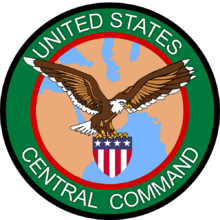Intelgate
| United States Central Command | |
|---|---|
 Emblem of the United States Central Command | |
| Active | 1983–present |
| Country |
|
| Type | Unified Combatant Command |
| Headquarters |
MacDill Air Force Base, Tampa, Florida, U.S. |
| Nickname(s) | CENTCOM |
| Engagements |
Persian Gulf War Iraq War War in Afghanistan |
| Commanders | |
| Combatant Commander | General Lloyd Austin, USA |
| Deputy Commander | Vice Admiral Mark Fox, USN [1] |
| Notable commanders |
General David Petraeus Admiral William Fallon General John Abizaid General Tommy Franks General Anthony Zinni General James Mattis General Norman Schwarzkopf |
| Insignia | |
| Shoulder sleeve insignia (US Army only) |
 |
Intelgate is an ongoing American political scandal, started in late August 2015 with whistleblowers leaking complaints to the press, concerning alleged manipulation of CENTCOM intelligence analysis regarding America's wars in Syria and Iraq.
Background
Before the 2011 Arab Spring, the United States began to support rebel groups inside of Syria in the hopes of overthrowing the Assad Government.[2][3] During 2013, the Islamic State of Iraq and the Levant (ISIL) became the dominant rebel force on the ground in Syria and started gaining ground in Iraq. By 2014, Islamic State in Iraq and Syria (ISIS) had declared a worldwide caliphate and the US began military campaigns in Syria and Iraq to try to halt the spread of that caliphate.
These military efforts fell under the authority of the United States Central Command (CENTCOM). CENTCOM military intelligence analysts were responsible with generating objective reports that would inform civilian leadership about the effectiveness of allied military efforts.[4]
Whistleblowers
In July 2015, 50 CENTCOM military analysts signed on to a classified complaint to the Pentagon's Inspector General that their intelligence reports were being inappropriately manipulated by members of CENTCOM.[5] They were subsequently joined by civilian and Defense Intelligence Agency analysts working for CENTCOM. Members of the groups began anonymously leaking details of the case to the press in late-August.[6][7]
Allegations
The whistleblowers allege that US Central Command attempted to portray a rosy image of the fight against the Islamic State by altering some reports to seem more positive, while burying other reports to keep them from the press and Congress.[8][9][10]
The analysts specifically alleged that the conclusions of both their reports about the readiness of indigenous forces to face ISIS, and about the effectiveness of the American air campaigns over Syria and Iraq, were completely reversed by the Administration before distribution.[11][12]
Reaction
Press outlets readily commented that the size and scope of cohort of whistleblowers was unprecedented, describing it as "a revolt" inside the intelligence community.[13][14]
Congressional representatives charged with overseeing the war have expressed shock and confusion over the scandal and have requested testimony from the Department of Defense officials involved in its handling.[15]
See also
References
- ↑ http://www.centcom.mil/en/about-centcom-en/leadership-en
- ↑ http://www.reuters.com/article/2012/08/02/us-usa-syria-obama-order-idUSBRE8701OK20120802
- ↑ http://www.cnn.com/2012/08/01/us/syria-rebels-us-aid/
- ↑ http://www.defense.gov/News/Special-Reports/0814_Inherent-Resolve
- ↑ http://abcnews.go.com/Politics/pentagon-confirms-investigation-skewed-intelligence-isis/story?id=33772763
- ↑ http://www.weeklystandard.com/articles/obama-s-intel-scandal_1032552.html
- ↑ http://thehill.com/policy/defense/253188-report-analysts-claim-us-military-altering-intelligence-on-isis-war
- ↑ http://abcnews.go.com/Politics/pentagon-confirms-investigation-skewed-intelligence-isis/story?id=33772763
- ↑ http://www.telegraph.co.uk/news/worldnews/northamerica/usa/11855274/Dozens-of-US-spies-complain-Isil-reports-rewritten-to-show-Syria-campaign-is-working.html
- ↑ http://www.huffingtonpost.com/amb-marc-ginsberg/obamas-syrian-strategery_b_8155424.html
- ↑ http://www.nytimes.com/2015/09/16/us/politics/analysts-said-to-provide-evidence-of-distorted-reports-on-isis.html?_r=0
- ↑ http://www.thedailybeast.com/articles/2015/08/26/spies-obama-s-brass-pressured-us-to-downplay-isis-threat.html
- ↑ http://www.thedailybeast.com/articles/2015/09/09/exclusive-50-spies-say-isis-intelligence-was-cooked.html
- ↑ http://www.businessinsider.com/intelligence-analyst-isis-allegations-2015-9
- ↑ http://www.nytimes.com/2015/09/16/us/politics/analysts-said-to-provide-evidence-of-distorted-reports-on-isis.html